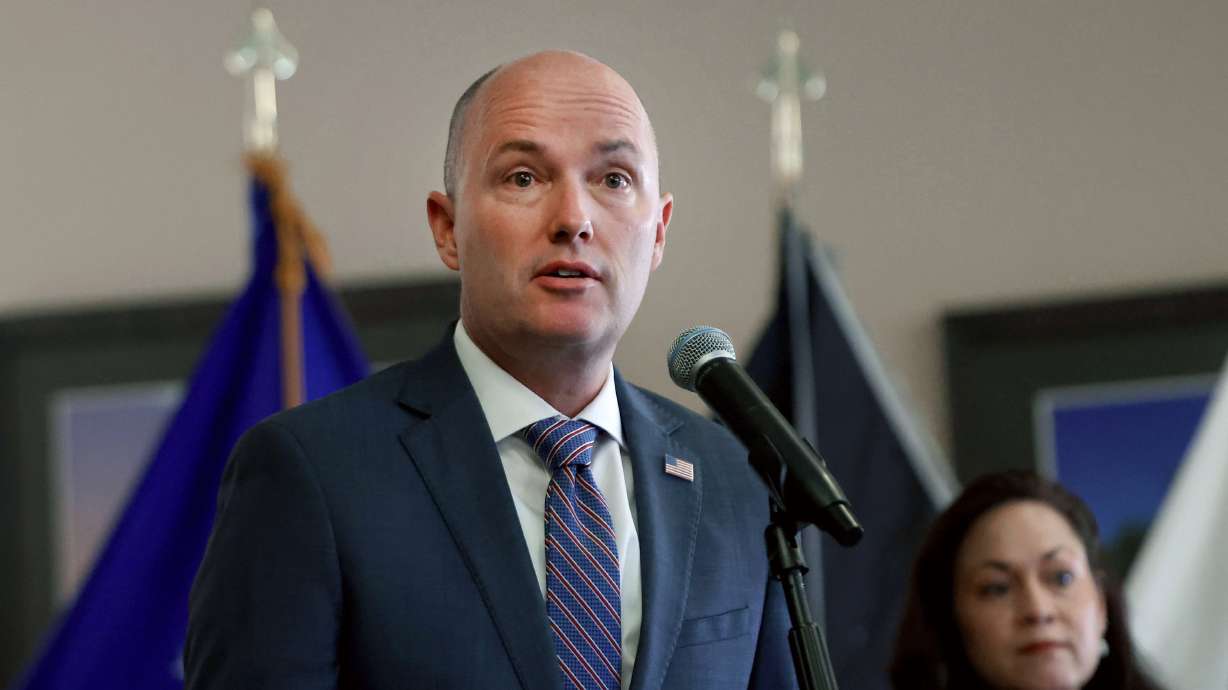Estimated read time: 3-4 minutes
This archived news story is available only for your personal, non-commercial use. Information in the story may be outdated or superseded by additional information. Reading or replaying the story in its archived form does not constitute a republication of the story.
- Gov. Cox claims deporting criminals will save Utah money by reducing prison costs.
- Utah prisons house 285 illegal immigrants, costing taxpayers $16 million annually.
- Cox supports Trump's deportation plans, emphasizing border security and cooperation with federal authorities.
SALT LAKE CITY — Utah Gov. Spencer Cox said additional funds to increase criminal deportations are not in his fiscal year 2026 budget recommendations because deportations will actually save the state money.
Last month, Cox announced new policy initiatives to assist President-elect Donald Trump in his plans to deport immigrants who break the law after entering the country illegally. In his budget reveal for the upcoming legislative session, Cox said these actions will pay for themselves.
"We would be using existing resources to help with that. And really, this would be a cost savings, though, to the state," Cox told the combined Deseret News and KSL editorial boards on Wednesday.

How many illegal immigrants are in Utah prisons?
There are currently an estimated 285 migrants who entered the country illegally in Utah prisons, making up roughly 4.6% of the state's prison population of around 6,200 inmates, according to the Utah Department of Corrections.
It costs Utah taxpayers an average of around $153 per day to house these inmates who entered the country illegally, adding up to $16 million each year, the department estimated. Of the 285 inmates, 181 were convicted of sex offenses, 59 were convicted of murder and eight are serving sentences of life without parole.
U.S. Immigration and Customs Enforcement has requested an immigration detainer for 233 of these inmates, requiring Utah law enforcement to notify the federal agency once the inmate has served their sentence so they can be taken into federal custody.
What has Cox promised with deportations?
Cox, a frequent critic of President Joe Biden's handling of border security, signaled his support for Trump's plans to deport migrants who commit crime in a press release on Nov. 26.
Trump has said he will implement the largest mass deportation program in U.S. history. During his reelection campaign, Trump alternated between promises to deport all migrants who have entered the country illegally — at least 11 million people — and promises to focus on those migrants with criminal behavior.
Cox proposed five policy priorities to increase coordination with federal and local partners to identify and deport "more illegal immigrants who have committed crimes and pose a threat to public safety."
The priorities, which will be pursued in a joint effort with the Utah Department of Public Safety and the Utah Department of Corrections, include:
Will Cox honor the Utah Compact on Immigration?
On Wednesday, Cox said he remained committed to the Utah Compact on Immigration, a statement signed by hundreds of Utah leaders in 2010 that balances the rule of law, a recognition of federal authority on immigration, an opposition to policies that separate families and an aspiration to integrate migrants into the economy. It was followed a year later by a historic package of state laws under the same name that included a guest worker program for undocumented migrants.
"The principles of the compact, I think, are still very important," Cox said.
But increased cooperation between state and federal authorities on migrant deportations will do little to boost public safety unless the southern border is secured, Cox said. If inmates are deported, they need to be incarcerated by their native country, Cox said. And this needs to be paired with a closed border or else immigrants could enter illegally again and become repeat offenders.
"The worst thing to do would be to send them away and then have them come back over here and commit another heinous crime," Cox said.
Utah is on track to hit 1 million pills of fentanyl that were confiscated by state law enforcement in 2024, including the confiscation of 20,000 pills and one pound of fentanyl on Wednesday morning, according to Cox.
Along with the $30.6 million allocated for public safety and $2.3 million for 10 new state troopers as part of that $30.6 billion budget announced last month, there is also money in the budget for increased interdiction of fentanyl pills, like those entering the state through U.S. Route 6, Cox said. But the state cannot "win that battle without federal help," Cox said.









